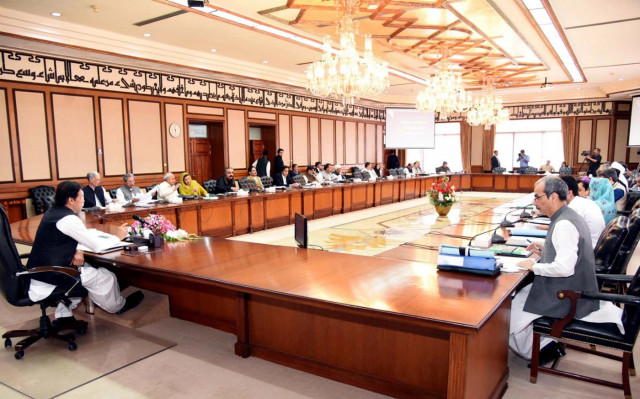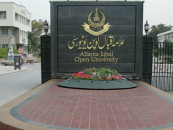Federal cabinet abolishes entertainment fund of ministries
Also briefed on board-based madrassa reforms, drug prices

Federal cabinet. PHOTO: PPI
Briefing the media on the cabinet meeting, Special Assistant to Prime Minister on Information and Broadcasting Dr Firdous Ashiq Awan said ministers were also informed about the steps taken by the health ministry for reduction in the prices of medicines.
Flanked by Power Minister Umar Ayub Khan, Awan said the cabinet also reviewed the issue of energy in depth and the power division was directed to ensure power supply during Sehr and Iftar in Ramazan.
Awan promised that the upcoming budget would meet people's expectations.
'Intelligent' Asad Umar will return to cabinet soon, says PM
Awan told the media that the cabinet approved abolition of allocation for entertainment and gifts in ministries and public sector organisations and decided that all posts in the ministries and divisions would be filled and no additional charges would be granted after three months.
"There were some provisions in ministries and divisions, under which funds were allocated for 'chai and pani' (tea and water). The cabinet has formally abolished these provisions today. So now there will be no entertainment and gift funds there," Awan said.
"The cabinet also decided to end the culture of additional charge in all the ministries and divisions within next three months as such posts will be filled properly. No summary for approval of additional charge will be presented in the cabinet in future," she added.
The cabinet meeting, chaired by Prime Minister Imran Khan, deliberated on 16 agenda items.
Federal cabinet defers fuel price-hike decision
"Most important among them was the improved supply of electricity to consumers during the holy month of Ramazan, especially during Sehr and Iftar hours," the special assistant to the prime minister said.
The cabinet was briefed by Education Minister Shafqat Mahmood regarding the initiatives to bring 30,000 madrassas into the national mainstream.
The minister stressed the need for one-window registration of these madrassas and monitoring of their funds.
"There is a wrong perception that these madrassas will be under the education ministry. These will be linked with the [education] ministry but work independently," she said. "The Ministry of Education will play the role of a facilitator to the madrassas."
Awan said modern education was the right of every child, studying in the madrassas. "We wanted to provide modern and quality education to them as they are also our children," she added. "The students will also be taught how to use social media in order to bring them out of isolation."
As per the vision of Prime Minister Imran Khan, Awan said, a uniformed curriculum would be introduced in all schools and madrassas. "The education ministry will also assist the foreign students, studying in these madrassas," she added.
In addition, she said, vocational training would be imparted to madrassa students for their capacity-building so that they could become more useful members of the society after completing their graduation.
Govt denies rumours of shuffle in federal cabinet
During the meeting, Prime Minister's Special Assistant on Health Services Dr Zafar Mirza informed the cabinet that the prices of medicines have come down following talks with the pharmaceutical companies.
He said, “A saving of Rs7 billion has been made on this account.”
The cabinet also decided to renew the licences of cellular companies worth $449 million.
Special assistant to the PM said the cabinet had also decided to establish Pakistan-China Engineering University at the Prime Minister House.
Awan said that China would provide about Rs400 billion for the university.
The special assistant to the prime minister expressed confidence that the next federal budget would be in line with the public expectations and all allied parties would be taken into confidence before presenting the fiscal budget in parliament.
The cabinet formally approved the appointment of Shabbar Zaidi as the new chairman of the Federal Board of Revenue (FBR) and granted approval for the extension in acting charge of the chairman of the Export Processing Zone (EPZ).
The cabinet ratified the decisions of the previous meeting of the Economic Coordination Committee (ECC) and ratified the agreement on technical cooperation between Pakistan and Brazil. It also decided to reactivate the Pakistan Steel Mills through public-private partnership. The cabinet approved agreements with Saudi Arabia for export of manpower.
The prime minister directed stern action against profiteers, hoarders and the mafias as well as the black sheep in the government machinery, trying to create an artificial crisis during the holy month of Ramazan.
The prime minister directed the chief ministers of Punjab and Khyber-Pakhtunkhwa to take stern action against hoarders and profiteers. Adviser to Prime Minister Razzaq Dawood informed the prime minister that enough sugar was available in the market.
To a question, Awan said the government has zero tolerance for hoarders, various cartels of essential items, and corrupt officers, who intend to create difficulties for people.
To another question about former prime minister Nawaz Sharif's return to jail in a Pakistan Muslim League-Nawaz (PML-N) rally, Awan said it was unfortunate that a convicted person went back to jail with such pump and show by his party.
"In civilised societies convicted persons are not glorified. Glorifying a convicted person is tantamount to committing the same crime," she said. "Nawaz Sharif is no more an accused, he is a convicted person. He [Nawaz] is violating all rules and laws of the jail manual," she added.
Speaking at the briefing, Power Minister Ayub said the government had set the target of getting rid of the power sector’s circular debt by December 2020, while new electric meters would be ensured in next four years in order to overcome line losses.
"During 2017-18, the circular debt increased by Rs450 billion, which will be brought down to Rs293 billion in the current year and Rs96 billion by 2019-20. The circular debt will be completely overcome by end of next year," he said.
Ayub said power theft issue has been contained to a larger extent. "There is no load-shedding on 80% of 8,783 total feeders in the country. We also want to provide electricity during Sehr and Iftar to 60 feeders currently under load management, but could not do so due to line losses and stealing."
The minister said Rs61 billion has been recovered from electricity thieves in the last five months through a vigorous campaign. During the drive, 4,225 arrests were made and 27,000 FIRs were lodged against the defaulters.
In the cabinet, Ayub said, the prime minister was informed that a 25-year plan had been finalised to bridge the ever-increasing gap between demand and supply of electricity.
Moreover, a fresh policy for power production through alternate energy resources had also been formulated, he added.
The installed capacity of the country was 30,000 megawatts while 24,000MW could be generated, he said, adding that under the new policy, 20% of the total electricity would be produced from alternative resources by 2025, which would be enhanced to 30% by 2030.
The minister assured that the Tribal Electric Supply Company would provide electricity for 10 hours each day instead of four hours in the tribal areas and there would be no load-shedding during Sehr and Iftar during Ramazan.
Ayub said more electricity could not be supplied because of lack of infrastructure. "We will build the infrastructure and install feeders, conductors and polls to improve the system and provide the same kind of facilities as available in other areas of Khyber-Pakhtunkhwa."
About the prices of petroleum products, he said that the PTI government had decreased the general sales tax (GST) and petroleum levy on the products as compared to previous governments.



















COMMENTS
Comments are moderated and generally will be posted if they are on-topic and not abusive.
For more information, please see our Comments FAQ